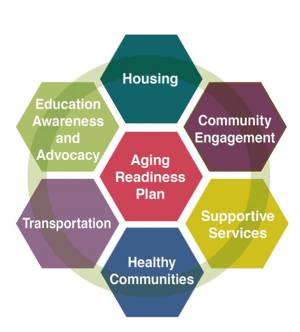- About Us
- Events & Training
- Professional Development
- Sponsorship
- Get Involved
- Resources
Commission on Aging 2020 Annual Report
The Clark County Commission on Aging pivots their work to focus on COVID-19 and older adults. Authors: Jenna Kay, AICP; a long-range planner for Clark County and staff support to the Commission on Aging We know that the aging population is growing substantially. By 2035, the United States will, for the first time ever, be a country that has more older adults than children. By that time, here in Clark County, more than 25% of the population, or one in four residents, will be 60 and better. In 2012, the then‐county commissioners created the Commission on Aging following an 18‐month study evaluating the community’s readiness for, and ability to serve, a quickly growing number of older residents. Education, Awareness, and Advocacy are the means by which the commission carries out its charge to provide leadership to manage and implement the county’s Aging Readiness Plan. Their topical focus areas include housing, supportive services, transportation, healthy communities, and community engagement. As the coronavirus spread in 2020, it became evident that older adults were disproportionately impacted by the pandemic in a variety of ways. Given this information, when the commission resumed meeting virtually last year, they decided to commit the rest of the year to learning about the impact the pandemic has had on older adults in Clark County. The commission decided to virtually host local experts who could provide insights on specific topics related to COVID-19 and older adults. Their meetings focused on: 1) access to food, supplies, and medications; 2) housing challenges for vulnerable older adults; and 3) the impacts of isolation and lack of socialization. The commission’s major takeaways begin on p. 18 of their 2020 annual report. Their conclusions span a wide range of topics, from providing technical support to older adults to meeting affordable housing needs in our community. I encourage you to take a look. Commission on Aging 2020 Annual Report
|


